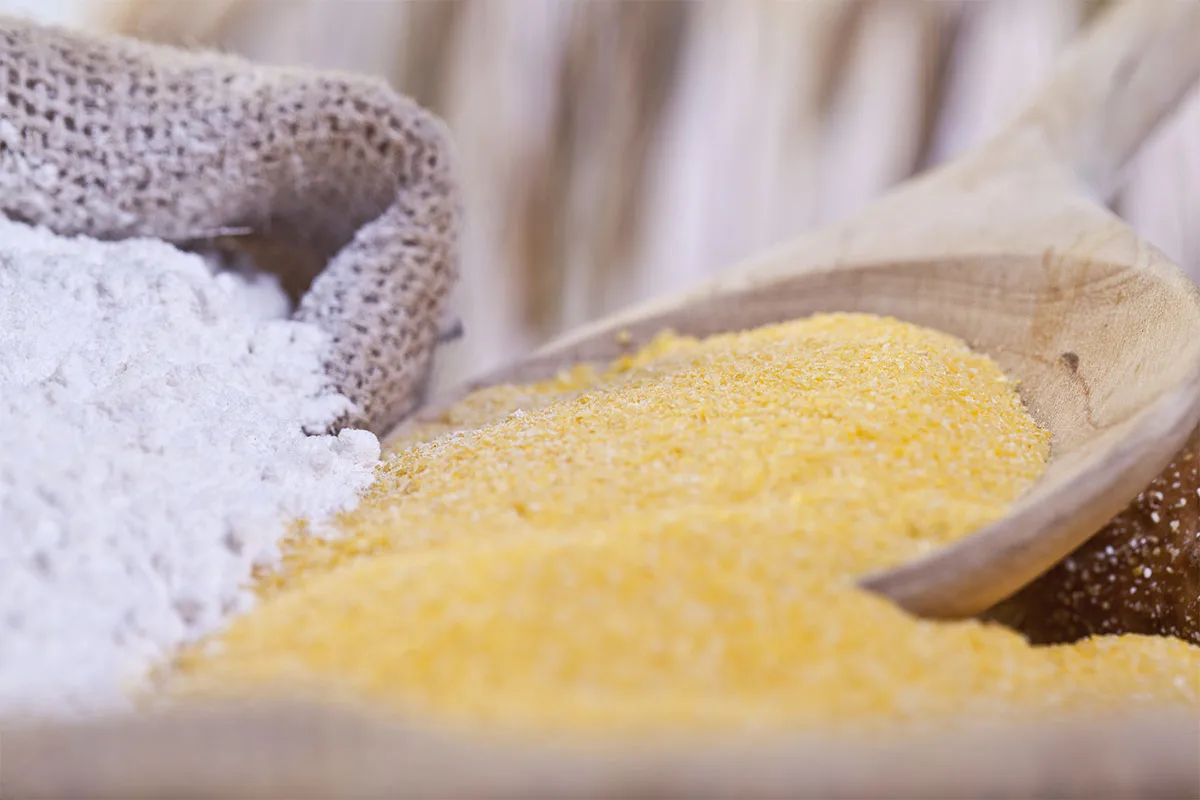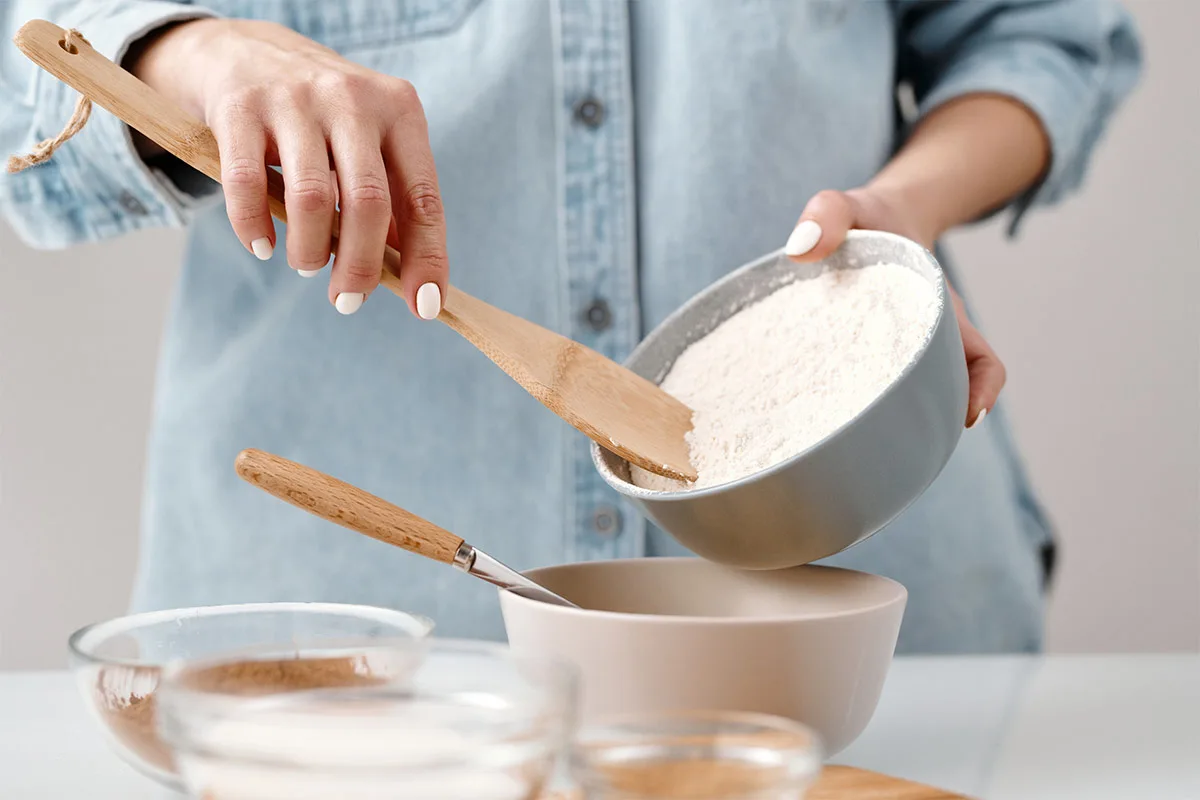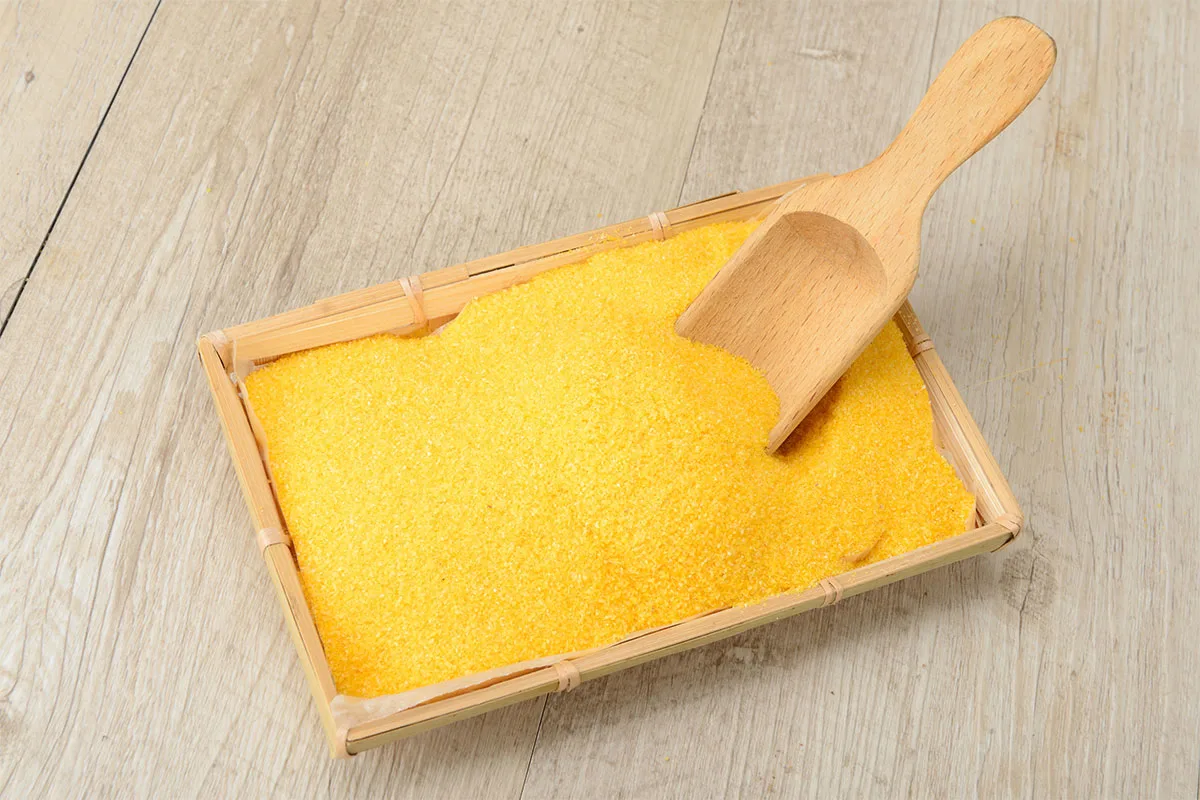Can you substitute cornmeal for flour? Yes, but consider a few things first.
Just to clarify! By “flour”, I’m referring to all-purpose flour, which is by far the most popular variety.
However, it doesn’t mean cornmeal can’t replace other options like almond flour or coconut flour.
Jump to:

Can you substitute cornmeal for flour?
Flour can be substituted for cornmeal, although the texture and flavor may change.
Cornmeal is nutty and coarser than flour. Flour is less absorbent than cornmeal, which might affect the final result.
Keep these variations in mind when substituting flour for cornmeal and alter the recipe accordingly. Understand the differences between cornmeal and flour before deciding if you can swap them.
Flour vs cornmeal
Cornmeal is coarsely ground corn, while flour is wheat or other grains. Cornmeal is coarser than flour and somewhat sweeter, which might affect your recipe.
Flour and cornmeal, two basic baking ingredients, differ in texture, flavor, and nutritional content:
Texture: Flour is fine, powdery wheat or grain flour. Bread, cakes, and pastries can use different types of flour for smoothness. Cornmeal, derived from the ground corn kernel, has a coarser texture. It’s a common ingredient in cornbread, muffins, and tamales.
Flavor: Flour’s bland taste lets other components shine. Cornmeal’s somewhat sweet, nutty flavor can give depth and richness to a dish.
Nutrition: Flour and cornmeal differ nutritionally. Cornmeal has more fiber, vitamin A, and iron than white flour, which has more protein and carbs.
Uses: Flour can be used in savory and sweet dishes. It’s a binding, leavening and thickening agent. Cornbread, muffins, and pancakes employ cornmeal for its somewhat sweet taste and rougher texture.
Why substitute cornmeal for flour?

Cornmeal can be used as a replacement for corn flour and regular flour in many different ways:
Taste: The somewhat sweet flavor of cornmeal makes it a great ingredient for giving baked products and other foods their own identity. Cornmeal, for instance, can improve the taste of cornbread by concentrating the corn flavor.
Texture: The rougher texture of cornmeal can give baked items a rustic, crumbly quality. Certain foods, including corn muffins and cornbread, benefit from this feature.
Nutrition: Cornmeal is a healthier alternative to flour since it contains more fiber and some minerals, such as iron and zinc, than wheat flour.
Gluten-free: Cornmeal is a great option for those with celiac disease or gluten sensitivity because it naturally contains no gluten.
Availability: Cornmeal is a viable alternative to flour in baking since it’s widely accessible and often cheaper.
Whether or not cornmeal is a suitable replacement for flour depends on the recipe and the end result.
When to substitute cornmeal for flour?
Cornmeal can replace flour in several recipes:
- Fried chicken or fish breading.
- Cornbread, muffins, and other rich, substantial foods.
- Pancakes, waffles, and other delicious dishes.
I like making crispy cornmeal waffles and topping them with some chili, sour cream and cheddar cheese (or any of these substitutes for cheddar cheese).
How to substitute cornmeal for flour?

There are a few things to bear in mind when substituting cornmeal for flour in a recipe.
-
As cornmeal is a more efficient liquid absorber than flour, you may need to adjust the amounts of other components.
-
For a smoother texture, coarse cornmeal may require a finer ground or a few pulses in a food processor.
-
Because of the pronounced flavor difference between flour and cornmeal, you may need to adjust the amount of sugar in your recipe accordingly.
-
Cornmeal won’t rise like flour since it lacks the protein gluten. Due to this, it could not be employed as effectively as wheat flour or other flours.
Have you ever asked yourself: “Can I use cornmeal instead of corn flour?” The answer is yes!
Cornmeal is the number one option on my list of corn flour substitutes along with masa harina, rice flour, all-purpose and more!
Frequent questions

Yes, you can make homemade cornmeal. All you need is whole corn kernels, a food processor, and some patience.
Cornmeal comes in a variety of grinds, from fine to stone-ground cornmeal. There’s even a special kind of dough flour used in Mexican cooking called masa harina. Check out my alternatives to masa harina for more info!
There are some other types of cornmeal depending on the type of corn. Yellow cornmeal is made from yellow corn, while white cornmeal is made from white corn.
Yes, you can use cornmeal as a corn flour substitute, although the results may vary depending on the recipe.
The texture of maize flour and cornmeal is the primary distinction between the two. Corn flour is a smooth powder made from finely ground corn, whereas cornmeal has a grainier consistency. Corn flour is milled from the kernel’s tender endosperm, whereas cornmeal also incorporates the kernel’s tough hull and germ.
Depending on the recipe and desired texture, some substitutes for cornmeal are polenta, masa harina, semolina flour, or rice flour.
Cornmeal improves the texture, taste, and nutritional value of baked foods. Cornmeal creates airier recipes which retain their tender texture for a longer period of time because it absorbs more moisture than flour. Some crunchiness is added as well.
Since corn starch and flour are so fundamentally different, it’s not the best alternative. Corn starch is a very fine powder that is best used as a thickening ingredient. It absorbs liquid and breaks down when heated.
Yes, you can use cornmeal instead of breadcrumbs. It can make a crunchy topping or coating in recipes. To use, simply coat your food item with cornmeal before baking or frying.
BOTTOM LINE: Finally, can cornmeal replace flour? Sure, but you must grasp the differences between the two substances and when to substitute. To get the greatest results when replacing flour with cornmeal, remember the preceding suggestions. Happy baking!
I hope this article has answered some of your questions regarding cornmeal as a substitute for flour. Share your favorite corn products and cornmeal replacements in the comments!
The baking aisle of the grocery store likely has various flour options. Check out these buckwheat flour substitutes and alternatives to chickpea flour for more ideas!
